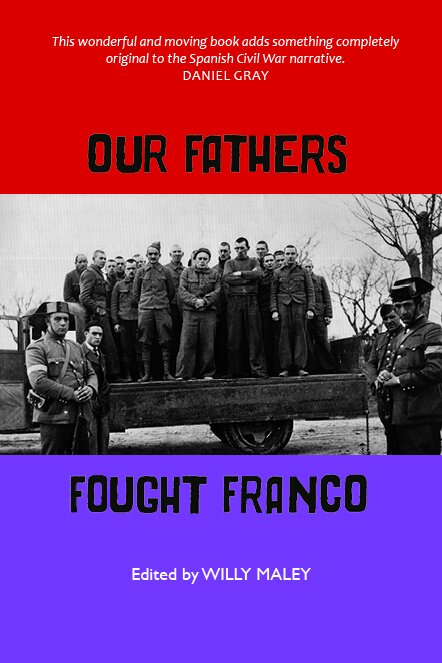Our Fathers Fought Franco
Remembering and celebrating those who fought fascism. Our Fathers Fought Franco, Edited by Willy Maley, Luath Press, £12.99. With contributions from Willy Maley, Jennie Renton, Tam Watters, Lisa Croft
Review by Lesley Orr
Jamara Valley, Spain. A February weekend in 1937, ‘And all of a sudden we found ourselves in the war…And we were in the war, and it was hell of a…it was some bloody war’.
James (Jimmy) Maley, Don Renton, Geordie Watters and Archie (AC) Williams: four young working class men were among the 120 members of No.2 Machine Gun Company of the British Battalion, fighting for the Republicans in the Spanish Civil War. Around 35,000 men and women from across the world left homes, families and communities to volunteer for the International Brigades (IB), including 2400 from Britain. With rudimentary training and antiquated weapons, No.2 Company was pitched into the chaotic carnage of the Battle of Jarama. Fewer than 30, including those four young men, survived to be captured, imprisoned, beaten, terrorised and sentenced, before release home on prisoner exchange in May 1937.
The creation, purpose and organisation of the Comintern-orchestrated International Brigades has been interrogated and contested from many perspectives, although with little scholarly examination of Scottish participation until Fraser Raeburn’s excellent book, Scots and the Spanish Civil War: Solidarity, Activism and Humanitarianism (2022). Yet (as Raeburn acknowledges) the power and resonance of that cause in Scotland has been highlighted in creative and compelling ways (including interviews, plays, and popular histories) through accounts of individual Scots volunteers.

Our Fathers Fought Franco is a testament to four men of socialist conviction and personal courage, but also to the marks their lives imprinted on their children and grandchildren. In telling the life stories of their fathers – ordinary working men who chose to do an extraordinary thing – the care with which each author constructs their chapter bears moving witness to the love and pride each feels for his or her parents.
The book’s fulcrum may be the Battle of Jarama, where four lives intersect, motivated by what Eric Hobsbawn called ‘the only political cause which, even in retrospect, appears as pure and compelling as it did in 1937’. But its heart lies not in military history (war is indeed hell), or even the personal examples of comradeship and sacrifice.
More significant, I think, are the local contexts, social bonds and passionate ideals which shaped the four men’s journeys to and from Jarama: James the ‘thrawn bugger’ from Glasgow’s East End; Don the lifelong Marxist agitator from Portobello, Geordie the Prestonpans miner; AC, the bright boy who emigrated to Canada and ended up on the road seeking work, like so many others during the Great Depression.
These are singular life stories, but bringing them together, a bit like the synoptic gospels, builds a more complex and layered portrait of events. It also highlights the connections and networks, commonalities and differences, which created conducive contexts for volunteering to fight against Franco.
They all belonged to large working class families, three of them growing up amidst the hardships and everyday struggles of industrial Scotland. They were intelligent autodidacts who knew the importance of learning from voracious reading, but also from experience. In the hungry interwar years they became activists and soapbox orators, rooted in local class struggles, but as committed internationalists.
Crucially, all of them found a political home in the Communist Party. Don and Geordie were close friends, battling Mosley’s Blackshirts in Edinburgh’s Usher Hall. Trade unionism, unemployment and the National Union of Unemployed Workers were formative, but it was the clarion call to defend democracy against the ominous forces of fascism that galvanised each decision to join the International Brigades. Beyond that defining moment, there were personal consequences – impaired health, MI5 surveillance, blacklisting, breakdown…The trajectories of their different lives after Spain followed paths which remained grounded in the fight for a better world
As is often the way, the men rarely talked to their children about these experiences, and this book is a record of family members doing the patient, collaborative work of research and reconstruction from fragments. Their narratives are inflected, as they should be, with the affective tones which signify complex, loving personal relationships and family hinterland.
There is appreciative recognition of the women who were stalwart comrades and enablers, whether within the constraints of traditional gendered roles, or as public activists like AC’s wife Jane Orme. Jennie Renton’s reflections on her childhood with a dad who was so often absent and drank too much, and the impact on her mum Queenie, are poignant.
Shadows and contradictions are part of the bigger picture; Jennie resists the hero-soldier narrative, but affirms Don’s consistent decency and vision. Each of the authors calls us to read the signs for our own times in the legacy of these men of the IB. This book is a fine tribute to them and their comrades.

This is an important book and its relevance for these times can’t be ignored. Reminding me that this cause had a profound effect on my young life although in a more indirect way.
I presume that such research is important in establishing that such participants were not mercenaries as classified by the UN:
https://www.ohchr.org/en/instruments-mechanisms/instruments/international-convention-against-recruitment-use-financing-and
and therefore anyone campaigning for the UK to ratify that Convention would still be able to support conscientious participants in conflicts with fascistic forces?
Although, I sometimes wonder why those that went from Scotland and the rest of the UK didn’t direct more support to anticolonial struggles within the British Empire.